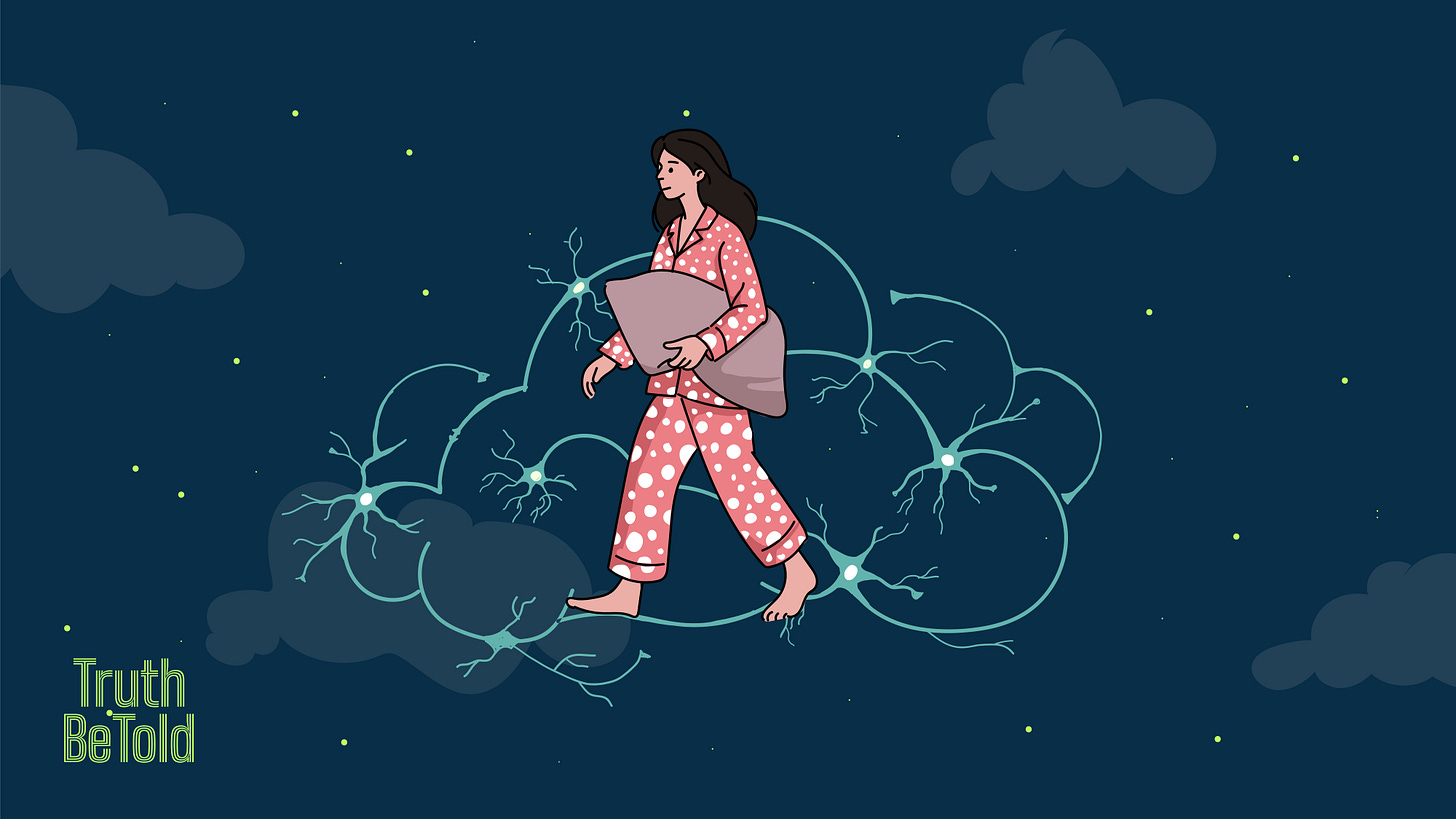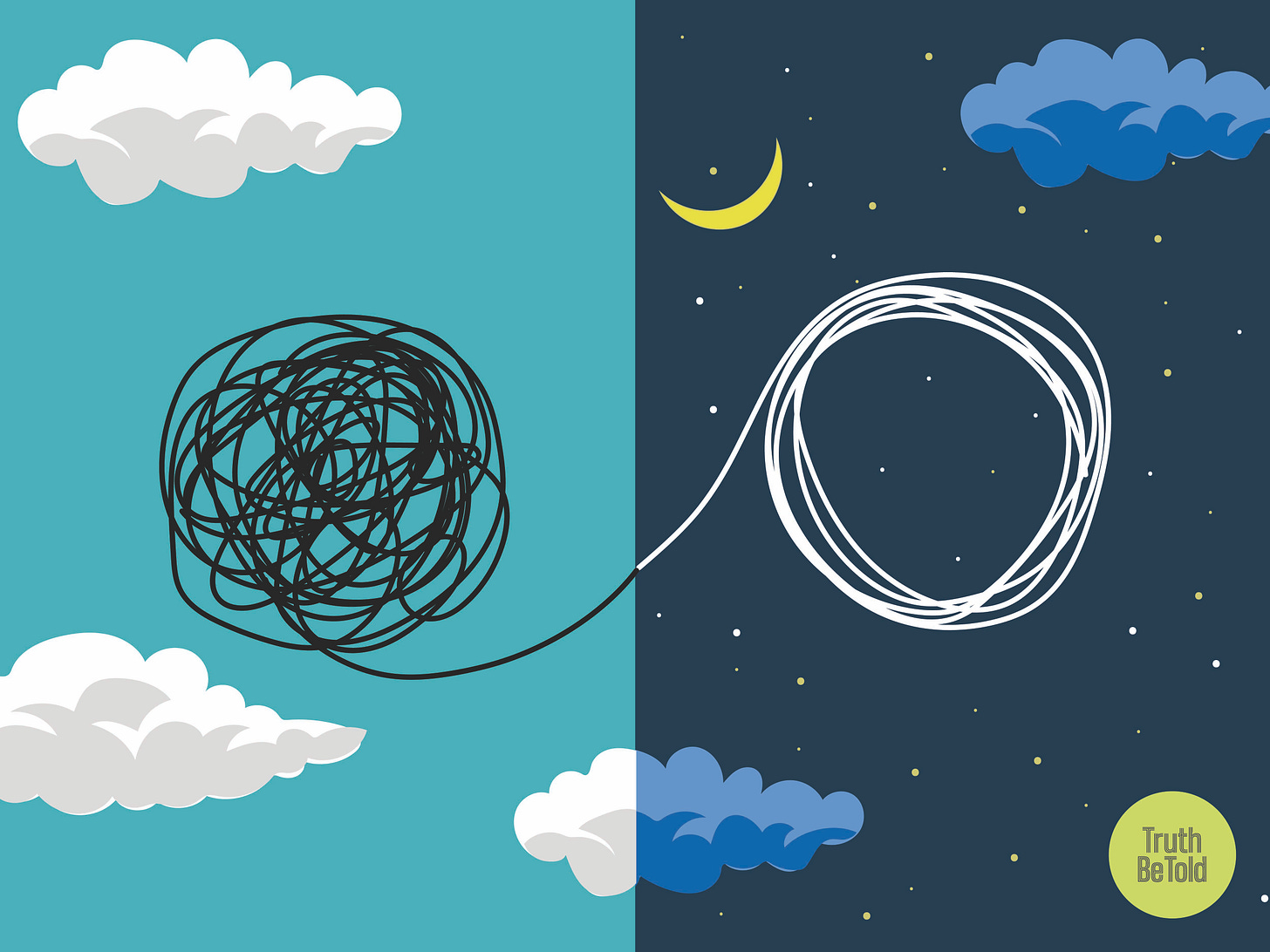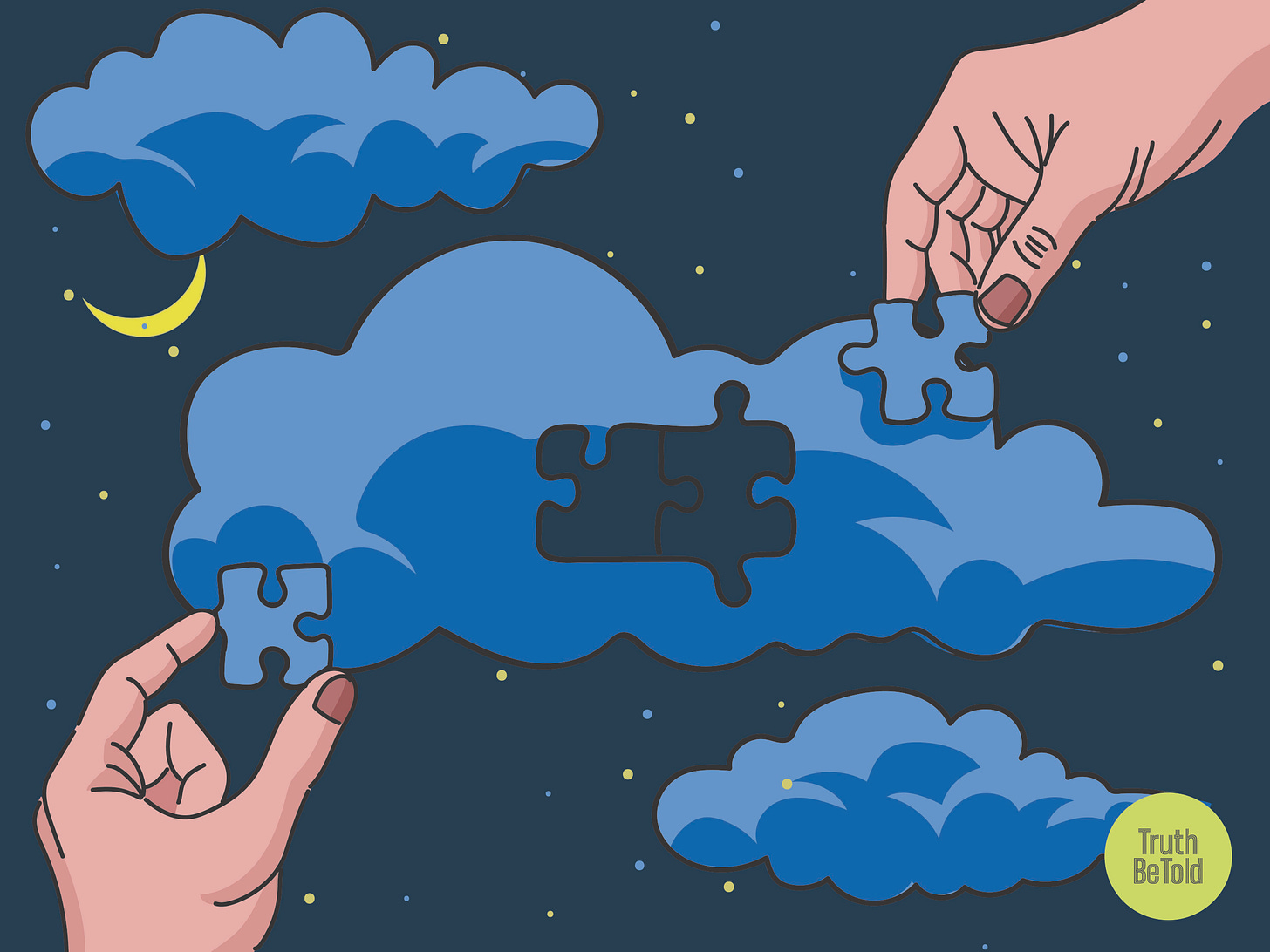The Three Things Your Brain Does While You Sleep
And why your weirdest dreams aren't random distractions.

Welcome to Truth Be Told, the weekly food and fitness newsletter published by The Whole Truth Foods.
Editor’s note: I find dreams fascinating. There was a brief period where I tried maintaining a dream diary to capture and understand what they were trying to tell me, which meant I would ridiculously wake up in the middle of the night, in the middle of the dream, to document what was happening (nuts, I know). So much of it made no sense (especially the ones where I was committing exactly the crimes I was so vehemently against) and some were cute meltdowns about everyday troubles like the suckiness of the office coffee machine. And sometimes, well, I have had my mind blown by finally finding the clue to a story I was stuck with at 7am in the morning right after waking up, or a math problem I could not solve just solved itself in my sleep. Dreams, hence, have always been mysterious.
This is exactly the topic Rohini Sen breaks down in today's TBT piece. The biology of our dreams—and what is actually happening. I enjoyed editing this piece because it helped me understand this mystery, and reinforced why good sleep is such a key ingredient for overall wellbeing!
Rohini Sen is a neuroscience and psychology graduate and works in the mental health space. You can reach her at rohinisen450@gmail.com.
PS: You can read more on sleep in previous TBT pieces: Ankush’s sleep experiments, Shantanu’s four-year long sleep diary.
It was an offhand remark in a college lecture that stuck with me. My professor mentioned that during REM sleep, the brain lights up almost as if awake, even though the body lies paralyzed. I remember blinking at that. If the brain is this active while dreaming, what is it actually doing?
Until then, I’d thought of dreams as strange, arbitrary night stories. Weirdly vivid, often nonsensical, sometimes disturbing. But that comment nudged me into a deeper question: what if dreams weren’t just fragments of imagination? What if they had a function?
That curiosity turned into a dive into the neuroscience of dreaming. Not as symbolism, but as biology.
And I found that every night, when you dream, the brain is organising memories, processing emotions, and making creative connections. Let me show you the science behind how this works—and why dreams are not random distractions.
The Neuroscience of Dreaming
When you sleep, your brain cycles through different stages. The deepest stage is called REM sleep—Rapid Eye Movement sleep—which is when your eyes move rapidly under your eyelids and when the most vivid dreams happen.
During REM, the part that usually keeps your thoughts logical and organised—the prefrontal cortex—goes quiet. At the same time, two other brain regions ramp up: the amygdala, which handles emotions, and the hippocampus, which processes memories. With logic turned down and emotion and memory turned up, your brain is free to do the repair work that dreams are actually for.
And in this neurochemically altered state, your brain runs three essential programs.
First, dreams maintain and organise your memory system.
During the day, your brain collects massive amounts of information: conversations and faces and what you learnt in your office meetings. Without some kind of sorting system, your brain would become super cluttered.
That's where dreams come in. They help the brain sort through and store this information, like organising files into the right folders. During REM sleep, the hippocampus—which plays a key role in memory—gets to work moving important experiences into long-term storage while letting unnecessary details fade away.
One study from the University of Rome shows this dream and memory connection in action. Researchers monitored students' brain waves while they slept and found something interesting: students who showed more activity in a certain type of brain wave—called theta waves—in the front part of the brain were more likely to remember their dreams. Interestingly, theta waves are also linked to memory recall when we’re awake.
This suggests that the brain may be using some of the same tools for dreaming as it does for remembering things in daily life.
More evidence comes from a rare condition called Charcot-Wilbrand Syndrome, where people stop dreaming after damage in a specific brain region which handles visual scenes and emotional memories. And when that happens, both dreaming and memory abilities are affected together—showing that dreaming isn’t just random, but deeply tied to how our brain and memory works.
Second, dreams help maintain your emotional balance.
During the day, you accumulate emotional experiences: stress from work, worry about family, frustration over things you can't control. These feelings don't just disappear when you fall asleep. Your brain needs to process them, and that's exactly what happens during REM sleep.
You've probably noticed how dream stories often feel like emotional rollercoasters—and there's a reason for that. You might start off calmly walking through a familiar place, only to suddenly find yourself in a high-stakes argument, reunited with someone you've lost, or running from an unknown threat. These sudden emotional shifts aren't random quirks of the sleeping mind—they're your brain working to process and regulate feelings.
During REM sleep, the amygdala, which handles strong emotions like fear, anger, and joy, becomes highly active. That's why these nighttime experiences can feel so intense, even when their content doesn't make logical sense. The emotional “charge” often lingers longer than the actual details.
One theory suggests that the brain uses this dream state as a kind of emotional "rehearsal," where it processes feelings and experiences in a safe environment.
Think of it like going over a tough conversation in your head before actually having it. By experiencing intense emotions in dreams, you're essentially “testing” your emotional responses without real-world consequences. This helps you manage feelings better when you encounter similar situations in waking life, making you more emotionally resilient.
Matthew Walker's research at UC Berkeley adds another layer: his lab found that disrupted REM sleep impairs emotional intelligence and your ability to read emotional cues in waking life.
In essence, dreams help you regulate emotions, process unresolved feelings, and maintain psychological balance.
Third, dreams fuel creativity by making unexpected connections.
During the day, your logical mind keeps thoughts organised and sensible. But creativity often requires connecting things that don't obviously go together—like realising a business problem might be solved using a principle from nature, or seeing how two completely different experiences relate to each other.
During REM sleep, the prefrontal cortex, your brain's logic centre, goes quiet. This gives your brain the freedom to make unusual connections between memories, ideas, and experiences that normally wouldn't link together. It's like rearranging puzzle pieces in new ways until you suddenly see a picture you hadn't noticed before.
The brain's chemical balance during REM makes this type of creative thinking easier. Higher levels of acetylcholine, which helps with attention, and lower levels of serotonin, which promotes calm focus, create the perfect conditions for wild brainstorming. It's no surprise that some of our best ideas come to us in dreams—your brain is literally doing late-night creative work (and not the universe whispering secrets).
In these moments, your brain becomes like a creative laboratory, experimenting with new combinations of memories, thoughts, and feelings that might seem disconnected while you're awake. So, dreams might be more than random—they're your mind exploring fresh perspectives and ideas you wouldn't think of during your daily routines.
This raises an intriguing question: if dreams serve such clear biological functions, why did humans spend millennia searching for hidden meanings in them? The answer reveals how we moved from mystical interpretation to scientific understanding.
From Myth to Mechanism
For a long time, people believed dreams were mysterious signs from the universe—omens, prophecies, or strange symbols that needed decoding. That changed in the late 1800s, when Sigmund Freud came along with a bold idea: dreams aren't from the beyond, they're from within.
According to Freud, dreams are the mind's way of letting repressed desires come to the surface, especially the ones we're not even aware of. Since the conscious mind might reject these desires in waking life, dreams allow them to sneak in, often through strange, symbolic forms.
A train entering a tunnel? Freud might say that's your unconscious speaking in code. While many of his interpretations have been debated (and mocked), his core idea—that dreams reflect deeper, unspoken parts of ourselves—still influences how we think about them today.
Then came Carl Jung, Freud's student turned critic. He agreed that dreams had meaning, but didn't think they were just about hidden wishes. Jung saw dreams as messengers offering guidance, insight and sometimes a push toward self-discovery.
He introduced the idea of a collective unconscious—a shared psychological space full of symbols that show up in everyone's dreams, no matter their culture. For Jung, recurring dream images weren't puzzles to crack but stories our minds were trying to tell us, helping us grow and understand ourselves better. Jung’s symbolic model continues to influence how we think about recurring dream motifs.
By the mid-20th century, the focus shifted to how dreaming relates to the brain’s information-processing systems. Psychologist Calvin S. Hall proposed that dreams are simply "thinking in a different state"—not about decoding hidden desires, but about how we mentally rehearse, simulate, and organise the experiences of daily life. They are just a continuation of our thoughts.
This perspective bridges naturally into modern neuroscience, which reveals the actual physiological processes behind dreaming. As it turns out, dreams are not just expressive or interpretive—they're functional.
And so yes, the dreams might mean something, just not in the mystical way people once thought.
So, what does all this mean for how you think about your sleep?
Well, good sleep is about feeling rested, but not just that: it's about giving your brain time to do crucial maintenance work. When you get quality REM sleep—and when you dream—you're allowing your brain to organise memories, process emotions, and make creative connections.
So if you've ever woken up puzzled by a bizarre dream, you now have a clearer lens through which to view it. That strange story wasn't meaningless—it was your brain's way of staying healthy.
While the world encourages us to “dream big” in our waking hours, maybe it's time to appreciate the uninvited dreams that arrive in sleep.
Sometimes, understanding our dreams isn't about decoding every symbol. It's simply about listening inward.





I have the most bizarre dreams with tons of emotion. They symbolically reflect what my intuition is thinking
Interesting post! I’m curious why you let go of your dream journaling and if, after re-visiting the importance of dreaming here, you might go back to the practice?